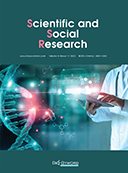Abstract
In this paper, the concept of pause patterns is analyzed within two aspects of speech, namely reading aloud and spontaneous speech. While reading aloud, much of the planning gets done by the speaker in preparing the text. As a result, the speaker becomes more fluent and does not need to take pauses (except at grammatical junctures). However, during spontaneous speech, pauses are much longer than reading and often more frequent because of hesitation aloud which results in disfluencies, false starts, repetition, and so on. This study explores the pause patterns in reading and spontaneous speech. The participants of this study consisted of 8 undergraduate students at Mehran University of Engineering and Technology. Data was collected through recording the students reading aloud and giving spontaneous speeches. The collected data was then analyzed. The results of the analysis showed that there is not much difference in the pattern of pauses while reading aloud and during spontaneous speech for those who are fluent in English.
References
Merlo S, 2010, Barbosa PA, 2010, Hesitation Phenomena: A Dynamical Perspective. Cognitive Processing, 11: 251–261.
Goldman-Eisler F, 1958, Hesitation and Information in Speech. Information Theory, Colin Cherry, London, 162.
Henderson A, Goldman-Eisler F, Skarbek A, 1965, Temporal Patterns of Cognitive Activity and Breath Control in Speech.
Lennon P, 1990, The Advanced Learner at Large in the L2 Community: Developments in Spoken Performance. International Review of Applied Linguistics in Language Teaching, 28: 309–321.
Riggenbach H, 1991, Toward an Understanding of Fluency: A Microanalysis of Nonnative Speaker Conversations. Discourse Processes, 14: 423–441.
Freed BF, 1995, What Makes Us Think that Students who Study Abroad Become Fluent?. John Benjamins, Philadelphia.
